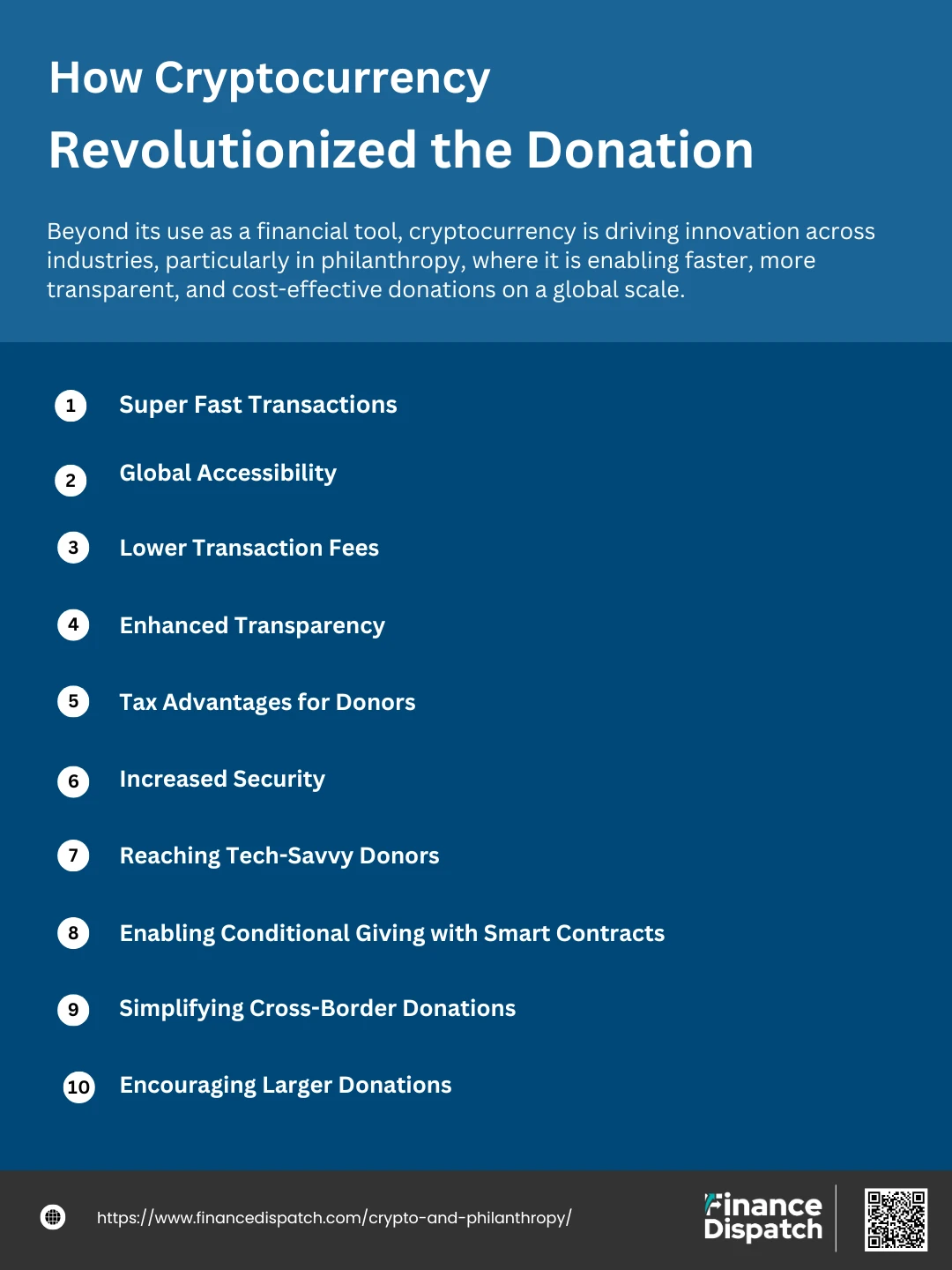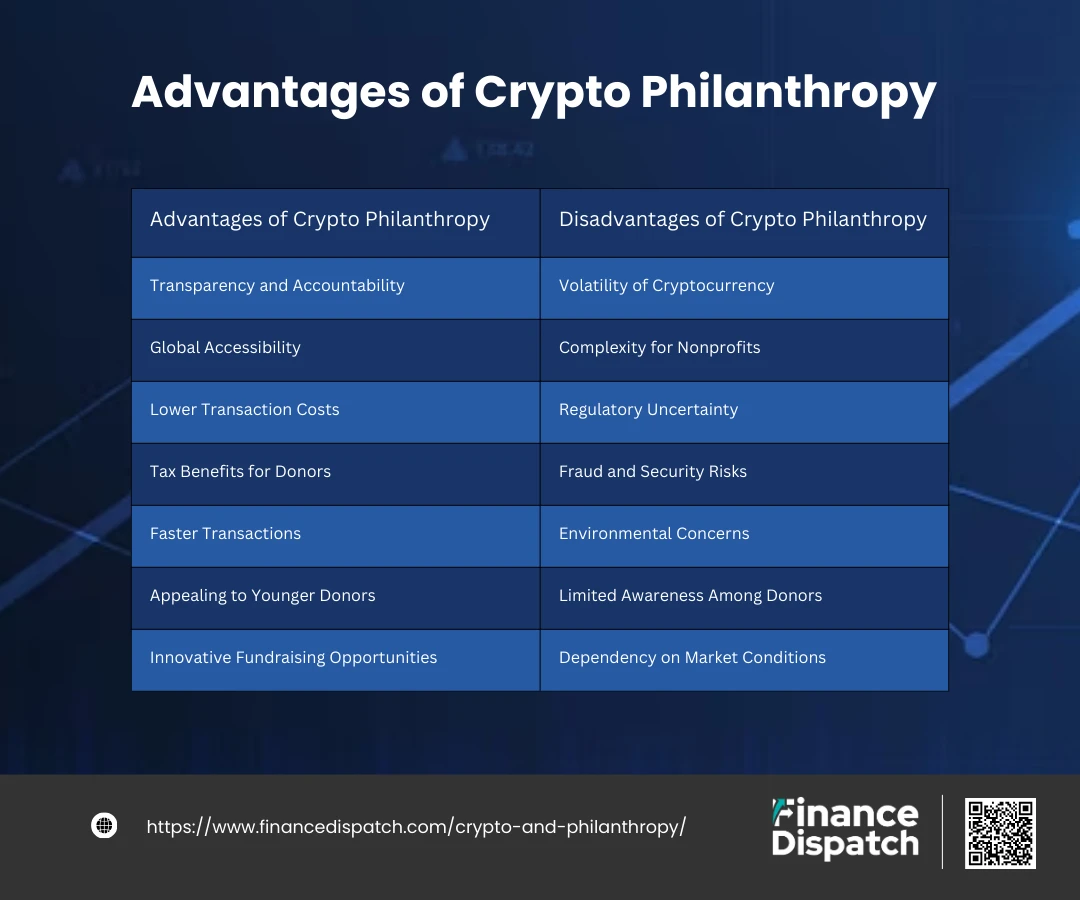The world of philanthropy is experiencing a groundbreaking transformation with the advent of cryptocurrency. Traditionally, charitable giving faced challenges like high transaction fees, slow processing times, and a lack of transparency. However, the rise of blockchain technology and digital currencies is redefining how donations are made and managed. From seamless global transactions to enhanced security and accountability, crypto philanthropy is not just a trend—it’s a revolution. This new era is empowering donors, expanding the reach of nonprofits, and opening doors to innovative ways of giving that were unimaginable just a decade ago.
What Is Cryptocurrency?
Cryptocurrency, often shortened to “crypto,” is a digital currency designed to function as a secure medium of exchange. Unlike traditional money managed by central banks, cryptocurrency operates on blockchain technology—a decentralized and transparent digital ledger that records every transaction across a global network of computers. This decentralized nature ensures enhanced security, eliminates the need for intermediaries, and reduces transaction costs. Popular cryptocurrencies like Bitcoin, Ethereum, and many others have gained widespread recognition, each offering unique features and applications. Beyond its use as a financial tool, cryptocurrency is driving innovation across industries, particularly in philanthropy, where it is enabling faster, more transparent, and cost-effective donations on a global scale.
The Evolution of Philanthropy and Donation Challenges
Philanthropy has long been a cornerstone of social progress, evolving from simple acts of charity to organized, large-scale efforts to address global challenges. However, traditional donation systems often struggle with inefficiencies, high costs, and a lack of transparency, leaving donors and recipients alike searching for better solutions. As technology advances, it offers opportunities to overcome these barriers and revolutionize how we give.

How Crypto Currency revolutionized the Donation
Cryptocurrency is revolutionizing the way donations are made, making charitable giving faster, more transparent, and accessible than ever before. By leveraging blockchain technology, cryptocurrencies are breaking down barriers like high fees, slow processing times, and limited global reach. This transformation is empowering nonprofits to connect with a new generation of donors and make a greater impact on the causes they serve.
1. Super Fast Transactions
Cryptocurrency donations are processed almost immediately, thanks to the efficiency of blockchain technology. Unlike traditional banking systems, which can take days to complete transactions—especially for international payments—crypto enables funds to be transferred and confirmed within minutes. This speed is particularly advantageous in emergency situations, such as disaster relief, where immediate financial assistance is critical.
2. Global Accessibility
One of cryptocurrency’s most transformative aspects is its borderless nature. Anyone, anywhere in the world, can donate using crypto without being restricted by geographical or banking limitations. This makes it easier for nonprofits to connect with a global donor base and for individuals in remote areas to participate in charitable giving. However, in countries where cryptocurrency is illegal, such as Algeria, Bangladesh, Bolivia, Morocco, Nepal, Pakistan, Qatar, China, and Ecuador, individuals and organizations cannot legally send or receive crypto donations, limiting its potential to drive global inclusivity in those regions.
3. Lower Transaction Fees
Traditional donation platforms often come with high fees due to intermediaries like banks and payment processors. Cryptocurrency transactions typically have minimal costs, allowing a greater portion of the donation to reach the intended cause. This is especially impactful for large donations or frequent contributions, where fees can otherwise accumulate significantly.
4. Enhanced Transparency
Blockchain technology records every transaction on an immutable public ledger. This level of transparency allows donors to verify how their contributions are being used, ensuring that nonprofits are accountable for the funds they receive. The ability to track donations builds trust and encourages repeat contributions.
5. Tax Advantages for Donors
Donating cryptocurrency offers substantial tax benefits. Donors can often deduct the full fair market value of their crypto gifts while avoiding capital gains taxes. This dual benefit incentivizes charitable giving and enables donors to maximize the impact of their contributions while reducing their tax burden.
6. Increased Security
Blockchain’s decentralized and encrypted infrastructure ensures that transactions are secure and resistant to fraud. Once a cryptocurrency donation is made, it cannot be altered or reversed, protecting both the donor and the recipient organization from fraudulent activities. This enhanced security gives donors peace of mind about the safety of their contributions.
7. Reaching Tech-Savvy Donors
Cryptocurrencies resonate with younger, tech-savvy generations who prioritize innovation, transparency, and digital-first solutions. By accepting cryptocurrency, nonprofits can engage with this emerging demographic, building connections with a group of donors who are often overlooked by traditional fundraising methods.
8. Enabling Conditional Giving with Smart Contracts
Smart contracts, a feature of blockchain technology, allow for conditional donations. For instance, a donor can specify that funds be released only when certain milestones are achieved, such as completing a project or reaching a specific goal. This ensures that donations are used effectively and provides an additional layer of accountability.
9. Simplifying Cross-Border Donations
Cryptocurrencies bypass the complexities of traditional cross-border payments, such as currency conversions and intermediary banking systems. Donors can contribute directly to international causes without incurring excessive fees or delays, making global philanthropy more efficient and accessible.
10. Encouraging Larger Donations
Cryptocurrency holders, especially those who have seen significant asset appreciation, often donate larger amounts than traditional donors. This is due in part to the favorable tax treatment of crypto donations and the wealth accumulated through early investment in digital assets. Nonprofits accepting crypto can benefit from these high-value contributions, amplifying their impact.
How to Accept Crypto Donations
Accepting cryptocurrency donations can diversify your nonprofit’s funding sources and appeal to tech-savvy donors. Here are several methods to facilitate crypto contributions:
1. Utilize an Intermediary 501(c)(3) Organization: Partnering with an intermediary nonprofit allows you to accept crypto donations without directly handling the cryptocurrency. The intermediary processes the crypto, converts it to cash, and grants the funds to your organization. This approach minimizes legal and accounting complexities. Platforms like Every.org offer such services, enabling nonprofits to receive crypto donations seamlessly.
2. Engage a Cryptocurrency Donation Processor: Specialized processors assist nonprofits in accepting crypto donations by managing transactions and conversions. They often provide tools to embed donation widgets on your website and handle tax receipts. Services like The Giving Block and Engiven are prominent in this space, offering comprehensive solutions tailored for nonprofits.
3. Integrate with Crypto Exchanges: Some cryptocurrency exchanges offer embeddable checkout experiences that can be added to your website. These platforms facilitate crypto donations and typically convert them to cash automatically. While they may charge lower fees, they might not offer nonprofit-specific features like donor support or tax receipt generation. Examples include Coinbase and BitPay.
4. Establish Your Own Crypto Wallet: For organizations with technical expertise, setting up a personal crypto wallet allows direct acceptance of cryptocurrency donations. This method requires managing the wallet’s security, tracking transactions, and handling conversions to fiat currency as needed. It’s crucial to implement robust security measures and establish clear policies for accessing and managing the wallet.
Considerations:
- Gift Acceptance Policies: Before accepting crypto donations, develop clear policies outlining which cryptocurrencies you’ll accept, how you’ll handle them, and procedures for converting them to cash. This ensures compliance with regulations and aligns with your organization’s financial practices.
- Tax and Legal Compliance: Cryptocurrency is considered property by tax authorities in many jurisdictions. Ensure you understand the tax implications and reporting requirements associated with accepting crypto donations. Consult with a tax professional to navigate these complexities effectively.
- Donor Information: Cryptocurrency transactions can be anonymous. If you need donor information for acknowledgment or tax purposes, implement processes to collect necessary details during the donation process. This can be facilitated through donation platforms that prompt donors to provide their information.
Examples of Crypto Philanthropy in Action
Cryptocurrency has already made a significant impact on philanthropy, with numerous real-world examples showcasing how digital assets are transforming charitable giving. From large-scale donations to creative uses of blockchain technology, these examples highlight the potential of crypto philanthropy to drive social change and support causes in innovative ways.
Examples of Crypto Philanthropy in Action
1. The Pineapple Fund
In 2017, an anonymous cryptocurrency holder known as “Pine” launched The Pineapple Fund, donating over 5,100 Bitcoin (valued at approximately $55 million) to 60 charities. The fund supported a range of causes, including environmental conservation, medical research, and mental health initiatives, showcasing the potential for crypto to make a massive philanthropic impact.
2. Ukraine’s Crypto Donations During Crisis
During the early days of the Ukraine conflict, the government and charitable organizations turned to crypto for rapid fundraising. In just a few weeks, they raised nearly $100 million in cryptocurrency, demonstrating the power of crypto for fast, borderless funding during emergencies.
3. Save the Children’s Crypto Campaign
Save the Children was one of the first nonprofits to accept cryptocurrency donations. Through partnerships with platforms like The Giving Block, the organization has raised significant funds in crypto, allowing it to reach younger, tech-savvy donors and support its global mission.
4. Orangutan Outreach and NFT Donations
Orangutan Outreach successfully leveraged NFT sales through The Giving Block to raise over $1 million. The organization partnered with the Bored Ape Yacht Club NFT community, with proceeds directly supporting conservation efforts for endangered orangutans.
5. Endaoment’s Blockchain-Based Giving
Endaoment, a blockchain-powered donor-advised fund (DAF), has facilitated millions of dollars in grants to nonprofits using cryptocurrency. Its innovative use of smart contracts ensures that funds are distributed transparently and efficiently.
6. Vitalik Buterin’s COVID-19 Relief Donation
Ethereum co-founder Vitalik Buterin donated over $1 billion in Shiba Inu cryptocurrency to India’s COVID-19 relief fund in 2021. This monumental contribution not only highlighted the scale of impact possible with crypto but also inspired other donors to follow suit.
7. The Giving Block’s Crypto for Good Campaign
The Giving Block has become a hub for crypto philanthropy, connecting thousands of nonprofits with crypto donors. Through its “Crypto for Good” campaign, the platform has raised millions for causes ranging from education to disaster relief, fostering collaboration between the crypto and nonprofit communities.
8. Binance Charity Foundation
Binance, one of the world’s largest cryptocurrency exchanges, has used its Binance Charity Foundation to support numerous initiatives, such as funding COVID-19 relief efforts, providing education supplies to underserved communities, and tackling environmental challenges.
Advantages and Disadvantages of Crypto Philanthropy
Crypto philanthropy has emerged as a groundbreaking way for donors to contribute to causes they care about. By leveraging the power of blockchain technology, it offers benefits like transparency, global accessibility, and tax efficiency. However, like any innovation, it comes with challenges that nonprofits and donors must navigate. Understanding the advantages and disadvantages of crypto philanthropy is key to maximizing its potential while addressing its limitations.

Advantages of Crypto Philanthropy
1. Transparency and Accountability
Blockchain technology ensures that all cryptocurrency transactions are recorded on a public, immutable ledger. This transparency allows donors to track their contributions in real-time and see how funds are being allocated. For nonprofits, this accountability builds trust and fosters stronger relationships with donors, particularly those who prioritize ethical and efficient use of their contributions.
2. Global Accessibility
Cryptocurrencies are not tied to any one country or banking system, making them accessible to anyone with an internet connection. This borderless nature allows donors from around the globe to support causes without worrying about currency exchange rates, international transaction fees, or banking infrastructure. Nonprofits can reach a truly global audience, opening up new opportunities for funding.
3. Lower Transaction Costs
Unlike traditional payment methods, which often involve banks or payment processors that charge high fees, cryptocurrency transactions typically bypass these intermediaries. This results in significantly lower transaction costs, ensuring that a greater portion of the donation reaches its intended purpose, which is particularly beneficial for large or frequent contributions.
4. Tax Benefits for Donors
Many jurisdictions provide substantial tax advantages for donating cryptocurrency. Donors can often deduct the full fair market value of their crypto at the time of the donation while avoiding capital gains taxes. This dual benefit incentivizes giving and allows donors to make a greater impact while reducing their taxable income.
5. Faster Transactions
Crypto donations are processed almost instantly, regardless of geographic location. This speed is particularly valuable for nonprofits addressing urgent needs, such as disaster relief or humanitarian crises, where immediate access to funds can make a critical difference.
6. Appealing to Younger Donors
Millennials and Gen Z donors, who are heavily invested in cryptocurrencies, are drawn to innovative and digital-first approaches to giving. By accepting crypto, nonprofits can connect with these tech-savvy donors, who value transparency, innovation, and social impact, fostering long-term engagement with a younger demographic.
7. Innovative Fundraising Opportunities
Cryptocurrency’s versatility enables nonprofits to explore creative fundraising initiatives, such as using non-fungible tokens (NFTs) or smart contracts. These tools allow organizations to design engaging campaigns, such as NFT auctions or conditional giving mechanisms, attracting crypto donors and generating buzz around their causes.
Disadvantages of Crypto Philanthropy
1.Volatility of Cryptocurrency
Cryptocurrencies are known for their price volatility, with values often fluctuating dramatically over short periods. For nonprofits, this creates uncertainty in the value of received donations, as funds could lose value if not converted to fiat currency promptly. This volatility can complicate budgeting and financial planning.
2. Complexity for Nonprofits
Accepting and managing cryptocurrency donations requires technical knowledge and resources. Nonprofits must set up wallets, integrate donation platforms, and train staff to handle crypto transactions securely. For smaller organizations with limited budgets, these technical and administrative challenges may be a barrier to adoption.
3. Regulatory Uncertainty
The legal and tax frameworks surrounding cryptocurrencies vary significantly across countries and are still evolving. Nonprofits and donors must navigate complex compliance issues, such as tax reporting and anti-money laundering regulations. This uncertainty can create additional administrative burdens and risks for organizations.
4. Fraud and Security Risks
While blockchain technology itself is highly secure, the wallets and exchanges used to manage cryptocurrency can be vulnerable to hacking, fraud, or mismanagement. Nonprofits must implement robust security measures to protect their crypto assets, which can require additional investment in technology and expertise.
5. Environmental Concerns
Some cryptocurrencies, like Bitcoin, rely on energy-intensive processes for mining and transaction verification, raising concerns about their environmental impact. Nonprofits with sustainability-focused missions may face criticism for accepting donations in cryptocurrencies perceived as harmful to the planet, creating potential reputational risks.
6. Limited Awareness Among Donors
Despite the growth of cryptocurrency, many potential donors remain unaware of the benefits of donating crypto or even the possibility of doing so. Nonprofits must invest in donor education and outreach to promote cryptocurrency giving, which can require time and resources.
7. Dependency on Market Conditions
The popularity and success of crypto philanthropy often correlate with the overall health of the cryptocurrency market. During market downturns, donor interest and contributions may decline, making crypto philanthropy less predictable compared to traditional fundraising methods.
The Future of Crypto Philanthropy
The future of crypto philanthropy is brimming with possibilities, as digital assets and blockchain technology continue to revolutionize charitable giving. With increasing mainstream adoption, more nonprofits are recognizing the potential of cryptocurrencies to expand their donor base, enhance transparency, and streamline global contributions. Innovations like NFT-based fundraising, smart contracts for conditional giving, and environmentally sustainable cryptocurrencies are set to redefine how funds are raised and distributed. As younger, tech-savvy generations take the lead in philanthropy, crypto is poised to become a cornerstone of modern fundraising. By addressing challenges like regulatory uncertainty and market volatility, the sector can unlock unprecedented opportunities for impactful and inclusive giving on a global scale.
Conclusion
Crypto philanthropy is transforming the way we approach charitable giving, breaking down barriers of geography, accessibility, and inefficiency. By leveraging blockchain technology and digital assets, it offers innovative solutions that enhance transparency, expand donor bases, and create new opportunities for impactful fundraising. While challenges such as market volatility and regulatory complexities remain, the rapid evolution of the crypto space promises to address these hurdles. As nonprofits and donors embrace this modern approach to giving, crypto philanthropy has the potential to redefine global generosity, making it more inclusive, transparent, and effective in tackling the world’s most pressing issues.
FAQs
1. Can small nonprofits benefit from crypto philanthropy, or is it mainly for larger organizations?
Small nonprofits can absolutely benefit from crypto philanthropy. While larger organizations may have more resources to invest in technical infrastructure, small nonprofits can use third-party platforms, such as The Giving Block or Engiven, to easily accept and manage crypto donations. These platforms simplify the process, allowing even resource-constrained organizations to tap into this innovative donor base.
2. How can nonprofits address concerns about the environmental impact of cryptocurrency?
Nonprofits can mitigate environmental concerns by focusing on sustainable cryptocurrencies that use energy-efficient mechanisms like proof-of-stake (PoS) instead of energy-intensive proof-of-work (PoW). They can also publicly align with blockchain projects that prioritize sustainability and advocate for eco-friendly crypto practices to reassure environmentally conscious donors.
3. What steps should nonprofits take to educate their donors about crypto donations?
Nonprofits should provide accessible educational materials, such as guides, videos, or webinars, that explain how to donate cryptocurrency, its benefits, and the associated tax advantages. Collaborating with crypto-focused platforms and influencers can also help raise awareness and build donor confidence in using crypto for philanthropy.
4. Are there specific causes or sectors that resonate most with crypto donors?
Crypto donors often align with causes that emphasize innovation, transparency, and global impact. Sectors such as technology education, climate change, human rights, and disaster relief are particularly appealing to the crypto community. Nonprofits that demonstrate a commitment to transparency and measurable outcomes are more likely to attract these tech-savvy donors.
5. What safeguards should nonprofits implement to ensure the security of crypto donations?
Nonprofits should use secure wallets, multi-signature authentication, and reputable exchanges to manage crypto assets. Partnering with trusted platforms that specialize in crypto donations can further enhance security. Regular audits, staff training, and adherence to cybersecurity best practices are also critical to protecting funds and donor trust.



